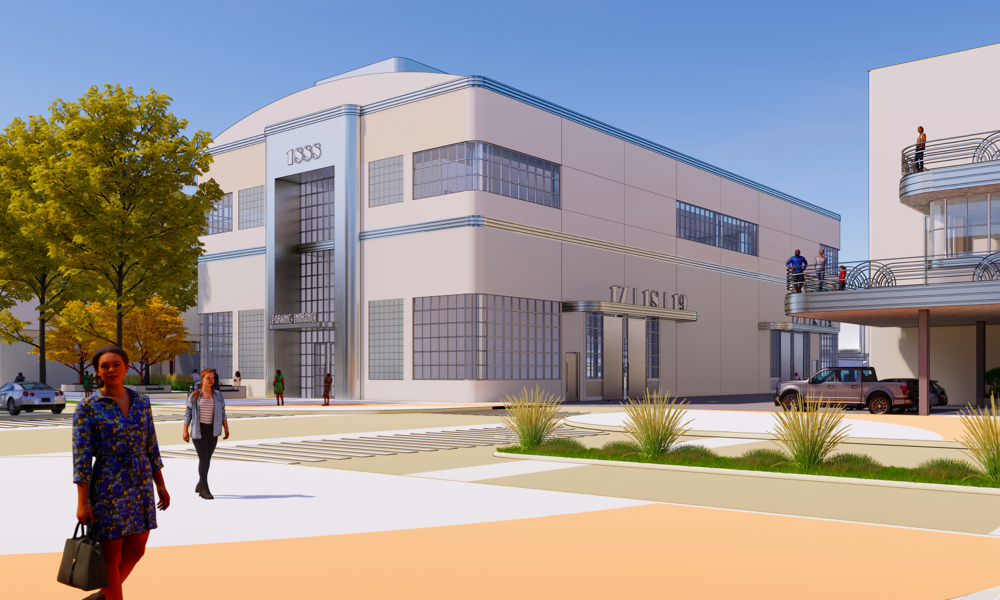
Bayonne is preparing to sell tens of millions of dollars in bonds to support the estimated $900 million construction cost of what redevelopers say will be the largest ground-up film studio in New Jersey, to be known as 1888 Studios, at the former Texaco site.
At the site at the terminus of Avenue A, surrounded by the Kill van Kull and Bayonne Bridge, Togus Urban Renewal, LLC is redeveloping the land into the film studio, which will be constructed using “100 percent union labor” through contractor Turner Construction.
At its November meeting, the City Council approved an application for the bonds to the Local Finance Board. According to its resolution, the city wants the approval from the Local Finance Board to issue up to $65 million of general obligation redevelopment area bonds.
The resolution states the city believes the bond issue is in the public interest, that the improvements are for the betterment of the community, that the amount to be spent is not unreasonable or exorbitant, and that the proposal will provide services for residents and will not create a financial burden.
Before the resolution was approved, resident Gail Godesky asked if this was the right time for the bond: “Are we going too late to the dance?”
This sparked some music-themed wordplay during the back-and-forth with Law Director Jay Coffey. He disagreed that the city was moving on this too late: “If they’re still playing music, it’s not too late. And they are still playing music.”
Godesky said with film studios being built in Newark and even in Oceanport, where Coffey is the mayor, that Bayonne shouldn’t risk paying anything into the film studio when a recession could be lurking around the corner.
Godesky asked, “Do we really want to take that chance now with the recession on the horizon, with inflation, and with people losing their jobs? Construction, development, and everything is going to start slowing down.”
Coffey said that it was a legitimate question, but that Bayonne was farther along than Newark and Oceanport. He said that in Oceanport, the municipality has not yet finalized a contract with Netflix.
“It’s a risk-reward scenario,” Coffey said. “You’re asking why we should go through with this and put $65 million up on a $900 billion dollar project… The answer is… what’s securing our $65 million is not just the land itself.”
Provision built in to assist city if need be
Coffey added the bonds are secured by the letter of credit provided by the redeveloper and the land itself. There is also a provision where the city can step in if the project falls through and take the land without going through the foreclosure process.
“There will be a letter of credit that underscores and secures the debt,” Coffey said. “It’s a letter of credit that provides cross collateralization, where you have equity and then you have actual real property. Then as the property gets developed, the letter of credit will be commensurately reduced because the value of the property is going up as the property is being built. If the property is not built, our total exposure is $65 million. I would dare say that having the land plus a $65 million letter of credit provides us with sufficient security. It even provides for any costs associated with taking over the property that would be borne by the developer. So that’s really a triple net zero to us.”
Godesky questioned why the redevelopers, including Togus Urban Renewal, LLC, couldn’t get a construction loan. Coffey said they are already getting a construction loan “of an incredible proportion.”
Godesky asked why they needed the bonds then and if they are short $65 million. Coffey said they are not short, and that this ensured construction was done how the city wanted it.
“This is a way to ensure that the development is done in a way that’s commensurate with what we want down there, how it’s going to be done, the type of labor that’s going to be used down there,” Coffey said. “This is a massive undertaking, and the city, by going after this financing, gets better rates than a private entity can… We get better rates. Are we involved in the risk? Yes. But this is a billion dollar project that brings thousands of jobs to the city of Bayonne.”
Coffey was confident in the nearly $1 billion investment by the redevelopers, which consists of $700 million in construction costs and $200 million in land costs and redevelopment fees. Godesky reiterated that now might not be the time amid a potential recession.
Coffey reiterated there is not a better time, noting that nothing was constructed in Bayonne between 2001 and 2014. However, after that, the market and the city’s outlook changed, with it being more willing to take risks to bring investors to Bayonne leading to a redevelopment boom in recent years.
“It was with great consternation we started opening up the spigot,” Coffey said. “These rooms were filled by people concerned about what happens if we do too much, what happens if we don’t do enough. I would say that now that the market has changed, you’re going to see a different approach to development on both the development side and our side.”

Content creation industry not subject to ‘market vagueries’
According to Coffey, the content creation industry continues strong regardless of the market. He said that a shift away from filming in Hollywood has prompted a need that 1888 Studios would seek to fill.
“In this case, this industry… creating content… for the foreseeable future, it’s not really something that’s subject to the vagueries of the market,” Coffey said. “Building this project is. But as far as content creation right now, I would say that for the next decade, there is a need to be able to create your own content and not having to deal with Hollywood and certain large corporations that would charge you for the services. These self-contained units where they make their own content and they don’t have to worry about another provider, that’s the business model that’s working.”
Coffey said that spaces like a film studio for content creation are coming to the East Coast now for a variety of reasons. He said that there’s been a paradigm change and that Netflix and the studios in Newark and Brooklyn have a different outlook than Godesky as to how things are going to go in the future.
Coffey conceded they could be wrong, to which Godesky conceded she may be wrong too. But she still felt it wasn’t the right time amid a possible recession.
“They’re playing the last song,” Godesky said continuing the musical analogy. “The bottom line is, I don’t think it’s the right time. I liked their presentation …a lot of people in Bayonne did. But right now, the way things are turning in the global economy. I just don’t think it’s the right time.”
Coffey noted that it’s more the redeveloper’s risk as opposed to the city, as long as the city is secured through the land itself and the letter of credit. Godesky asked if the city would need to sell the property if everything fell through, to which Coffey noted it likely wouldn’t need to do that since it has $65 million bonds backing it up.
Godesky still disagreed with the project, but Coffey remained adamant it would be a risk worth taking. The council then unanimously approved the resolution.
No working nights, weekends, and holidays
Also at the November meeting, the council voted on another resolution regarding 1888 Studios that would have authorized redeveloper Togus Urban Renewal, LLC to work on nights, weekends, and some holidays. Coffey said this is in conjunction with raising the elevation nearly 17 and a half feet.
“We have a restriction against performing work on national holidays,” Coffey said. “There is water-based work. Essentially, it involves barges coming in to build up the site. The request was, could they have an exemption from the no work ordinance on federal holidays.”
Coffey said that through discussions, Mayor James Davis did not have a problem with it due to its isolated location at the tip of the Bergen Point neighborhood. However, the only holiday Davis was opposed to was Christmas.
La Pelusa said the resolution would allow construction for six federal holidays, except for Christmas Day. It would apply for the rest of this year and run until the end of February in 2023.
Second Ward City Councilwoman Jacqueline Weimmer noted she was concerned it would be a quality of life issue. La Pelusa agreed, but highlighted there was a measure that would allow the council to negate the resolution if there are issues.
“I’m always against allowing work on holidays and after hours,” La Pelusa said. “But this has a provision here that the city reserves the right to declare this resolution null and void, without further action by the municipal council, if any justified complaints are lodged with the Bayonne Police Department, the Bayonne Law Department, or any other department within the city of Bayonne in connection with the noise disturbances arising out of said construction activity.”
La Pelusa said there were some residences in the area. But he noted the immediate surroundings were mostly non-residential uses.
“That’s the reason why I would consider it,” La Pelusa said.

Raising the site elevation
Coffey added this wasn’t for construction yet but for filling in the land to raise the elevation.
“It’s not so much construction as it is water-borne, like it’ll be coming up with barges on the west side of the property,” Coffey said.
Weimmer asked the audience at the meeting if there were any residents who lived in the area. While there were none present, another resident Mike Ruscigno, addressed the issue, stating the work was more than just barges dropping off dirt.
“What they’re doing now, they’re compacting property while they clear the contamination and dropping in new dirt and pounding it,” Ruscigno said. “That cannot go on. You hear it everywhere. People go to the park to enjoy it and do stuff. So they don’t want it going on during the holidays.”
La Pelusa repeated that if there were any complaints, the council could void the resolution. Godesky said that the resolution wasn’t worth it and asked the council to vote against it.
“It’s going to take years for them to build it anyway,” Godesky said. “Don’t allow it please. Quality of life is important. We’re losing our quality of life here in this city… with all the construction and everything else going on. It’s not worth it. They could do without the six days, we’re giving them $65 million.”
La Pelusa reminded that another caveat of the resolution was that it could allow them to work at night from 6 p.m. to 6 a.m. Godesky called that ridiculous, and that it would affect people who live in the area.
First Ward City Councilman Neil Carroll said he was more concerned about work going on during the nights and weekends than on holidays. Weimmer agreed, to which La Pelusa echoed them both, and suggested the council not do it.
With that, the resolution was not approved. Meanwhile, also at the meeting an ordinance set to be introduced that would approve a financial agreement with Togus Urban Renewal, LLC was withdrawn. The city previously announced its intention to enter into a payments-in-lieu-of-taxes (PILOT) agreement with Togus Urban Renewal, LLC which will bring in $200 million to the city over a 30-year term.
While things are still being ironed out, the city and redevelopers are very much moving forward with the construction of 1888 Studios full steam ahead. Vertical construction of the studio is slated for the first quarter of 2023, and some industry insiders are already hyping the project.
For updates on this and other stories, check www.hudsonreporter.com and follow us on Twitter @hudson_reporter. Daniel Israel can be reached at [email protected].









